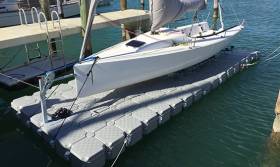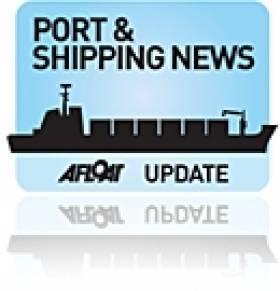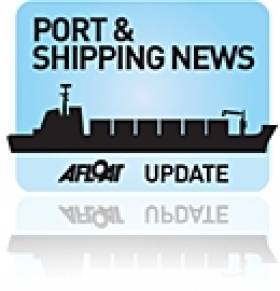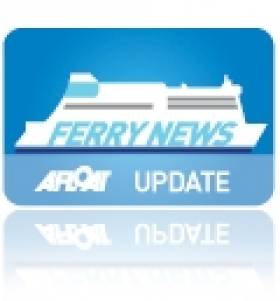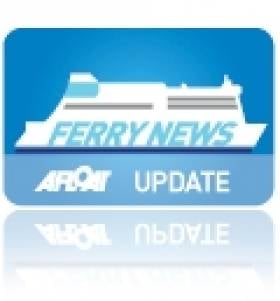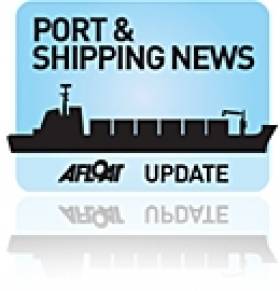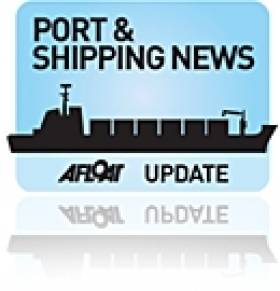Displaying items by tag: DryDock
W.B. Yeats returned to the Irish Sea following a scheduled routine dry-docking in France which sees the cruiseferry operate the Dublin-Holyhead route over the winter months, writes Jehan Ashmore.
The 1,850 passenger/1,216 car and 165 lorry capacity W.B. Yeats on Friday departed Dunkerque (East) for the repositioning voyage back to Ireland.
Afloat.ie however tracked the 54,975 gross tonnage cruiseferry make an en route call to Cherbourg before completing with an overnight passage to Dublin Port. This involved an arrival on Saturday mid-morning.
Several hours later, W.B. Yeats resumed duties with the 14.30hrs sailing from the Irish capital. As previously reported on Afloat, ICG (parent company of Irish Ferries) have a 'contingency plan' with space set aside on the €144m cruiseferry for a post-Brexit duty-free shop though this depends on the nature of the UK's exit deal.
Also previously reported, W.B. Yeats completed a first season on the Dublin-Cherbourg route. Afterwards the cruiseferry took up service as scheduled for a brief spell on the Welsh route joining Ulysses. The ropax Epsilon, however from this service swapped with W.B. Yeats so to provide cover while the dry-docking took place in northern France.
The chartered in Italian flagged Epsilon continues as scheduled to maintain serving the direct year-round operated Ireland-France route for the winter. In the meantime this leaves the largest ferries of the company's fleet, Ulysses and W.B. Yeats sharing crossings on the Irish Sea central corridor service.
Sailings between the Irish capital and mainland continental Europe to be operated by W.B. Yeats for season 2020 begin on 28th March departing Dublin Port
Lift out on to hard standing is the ideal way to keep a sportsboat clean but has the added burden of lift in and out each time you want to sail. VersaDock, the modular floats provider for pontoons and dock solutions, has introduced its latest dry dock to give sportsboat and other small sailing boat owners the benefits of low maintenance and convenience of berthing their boats clear of the water.
The latest generation Version 2 of the VersaDock DrySail™ System (V2) has been designed and engineered specifically for modern lifting keel sports boats. New technology and design has enabled the DrySail™ V2 to be extremely light and very easy to assemble.
Drysail ™V2 is sold as an alternative to marina drysailing contracts, or being in the water for lond periods. It’s easy to winch your own boat in and out of the water in around a minute at any time. The stable platform gives handy all round access to the boat.
Drysail ™V2 is less than half the weight of previous generations of drysail docks, and its frames are smaller and easier to pack, which claims Versadock means there are huge savings to freight costs to any part of the world. Best of all, the new design is so simple to assemble that you can do it yourself, saving on installation charges.
The DrySail™ V2 system works in conjunction with all other VersaDock systems and can be integrated into their standard pontoons, platforms, drive on docks and walkways. The standard dock fits into a normal sized marina berth, turning it into a drysail platform, and it can be moored alongside other pontoons, or secured to river moorings. In fact its versatility means it can be put virtually anywhere where a boat can float onto it. It can even sit securely on the bottom if the tide dries out.
VersaDock has designed the new DrySail™ V2 dock for the J/70, Melges 24, SB20 and Longtze Premier, to name a few types of sportsboats, while the system can easily be optimised to fit individual requirements.
VersaDock are offering Drysail ™V2 at an introductory price of £6100 ex. tax and delivery for a typical J/70 dock until 1st July.
#ShipsRudder- A containership Arslan II (1991/3,125grt) that is understood to have got into difficulties involving her rudder off Arklow Bank in January, and has since remained in a Dublin Port for almost two months, is scheduled to depart today, writes Jehan Ashmore.
As previously reported on Afloat.ie, following the incident off Arklow Bank, the German-owned vessel was initially assisted by a single tug. When the tow had reached Dublin Bay a Dublin Port Co tug joined in to assist operations of the 260TEU container capacity vessel into port.
In February, the Arsalan II was moved into the No.2 dry-dock facility of Dublin Graving Docks Ltd.
A report of the incident off Arklow Bank is currently undergoing an investigation by the (MCIB) Marine Casualty Investigation Board. In recent days the 86m long vessel vacated the dry-dock to a nearby berth within Alexandra Basin from where she is to set sail.
The Future’s Green, Bright and Orange
This month ASN are due delivery of the 4,700 gross tonnes Arklow Bridge, the second 'B' class newbuild was also built by the Dutch company of Bodewes Shipyards B.V. She is the fifth vessel to carry this name since Arklow Shipping was founded in 1966.
The Arklow Bridge is registered in St. John's the capital of the Caribbean island of Antigua where she will be flagged. Antigua became an associated state of the Commonwealth until it was disassociated from Britain 30 years ago.
Her sister Arklow Brook entered service this year and is designed with two holds with a total (grain and bale) capacity of 9473.1m3 or an equivalent of 33,4524 ft3.
For cargo-separation the holds can be sub-divided by a portable bulkhead in up to 8 positions. In addition to carrying agricultural-based cargoes, the 116m (OA) overall long vessel can handle 177 (TEU) containers in the hold and another 88 can be stowed on top of the hold's hatch covers. Both the holds are fitted with dehumidifier's.
The power-plant is derived from a MaK 6M32C 2999kW main engine with a Renk gearbox and Berg controllable pitch propeller that provides around 12 knots.
With the entry of Arklow Bridge, the combined fleet is over 40 ships that trade in the north-west of Europe and the Mediterranean. For further vessel statistics of the sisters click here and for a photo of the new vessel click this link.
Asides the Rotterdam based operation of ASN, the Irish side of the company is the largest indigenous owned shipping company in terms of Irish-flagged and registered tonnage. Arklow is not only the headquarter's of ASL but the homeport is also where the vessels are registered.
- Dublin Port
- Co. Wicklow
- Arklow Shipping
- Newbuilds
- The Netherlands
- Arklow Shipping Ltd
- Ports and Shipping News
- Caribbean
- DryDock
- Antigua
- British
- Dublin Port news
- Arklow Bridge
- Arklow Brook
- ASN
- Arklow Shipping B.V.
- Irishflagged
- Irishregistered
- Arklow Future
- Bodewes Shipyards
- Dutchflagged
- Antiguaflagged
- Mak
- The Commonwealth
- River Avoca
Stena's Southern Sailings
In the meantime freight-only ferry Stena Seafarer is operating the St. Georges Channel route having arrived at Rosslare on a repositioning voyage from Belfast on 29th March.
Stena Seafarer (1975 / 10,957grt) was one of a trio of freight-ferry sisters that served the Larne-Fleetwood port route until its closure in December. Like her sisters Stena Leader (1975 / 12,879grt) and Stena Pioneer (1975 / 14,426grt) they were built at the West German shipyard of J.J. Sietas in Hamburg.
Stena Seafarer's sisters remain laid-up in Belfast and with each vessel over 35 years in service it would seem likely there are nearing the end of their careers, at least on the Irish Sea.
To provide additional passenger capacity the Stena 'Express' fast-ferry service will return to the southern corridor route between 1 July-4 September. The high-season sailings as usual will be operated by the InCat built Stena Lynx III which is to operate a daily single round trip in tandem with Stena Europe.
Amendment to Fastnet Line Ferry Schedule
Reservations Office Ireland : +353 (0) 21 4378892
Open Monday - Friday 9.00 am - 5.30 pm
Reservations Office UK: 0844 576 8831
Open Monday - Thursday 8.00 am - 8.00 pm
Open Friday 8.00 am - 7.00 pm
Open Saturday and Sunday 9.00 am - 6.00pm
Ferry-Go-Round on the Irish Sea
In the case of Irish Ferries, their Rosslare-Pembroke Dock route vessel, Isle of Inishmore arrived on the Mersey yesterday at the Cammell Laird dry-dock facility in Birkenhead.
The 1997 Dutch-built Isle of Inishmore had relieved the 50,938 tonnes 'flagship' Ulysses from the Dublin-Holyhead route which too had gone to Birkenhead for maintenance since January 4th.
The Ulysses is now back on service and the company's French routes cruiseferry, Oscar Wilde is covering the Isle of Inishmore's absence from Rosslare-Pembroke Dock sailings.
Continental services to France on the Rosslare-Cherbourg route will resume on February 16th when the Oscar Wilde returns from her overall. The Bahamas flagged vessel will re-open seasonal Rosslare-Roscoff sailings starting on May 13th.
In addition to conventional tonnage Irish Ferries also operate the fast-craft catamaran Jonathan Swift in tandem with Ulysses on the Dublin-Holyhead route. The Ulysses takes 3 hours 25 minutes while the 39-knot catamaran craft marketed as the Dublin 'Swift' is advertised with a scheduled passage time of 1 hour and 49 minutes.
The Australian-built catamaran was taken off the central corridor route yesterday to be drydocked also in Birkenhead until January 18th. Dublin Swift sailings return to the Dublin-Holyhead route on February 19th with the first crossing to depart at 14.30 hours from the capital port.
For the latest information on ferry sailings and reservations click: www.irishferries.com
Fastnet Line Cancel Tonight's Sailing
Operators of the Cork-Swansea route, Fastnet Line regret to announce that tonight's (13 January) sailing from Cork to Swansea is cancelled. The company has cited technical reasons for the cancellation of the sailing. The 10-hour route linking Munster with South Wales is served by the M.V. Julia.
Fastnet Line are contacting all passengers to assist in making re-bookings or refunds. Those wishing to contact the ferry operators' reservation team for further information can contact the details listed below.
The Julia is to go into dry-dock this week in Swansea. The vessel will remain in Swansea while undergoing annual maintenance up to and including Wednesday 9th February. Her first sailing will be at 20.30hrs from Swansea to Cork on Wednesday 9th February 2011.
To contact the Fastnet Line Irish Reservations Office Tel: +353 (0) 21 4378892 (Open Monday – Friday) 9.00 am - 6.00 pm
To contact the UK Reservations Office Tel: 0844 576 8831
(Open Monday – Thursday) 8.00 am - 8.00 pm
(Open Friday) 8.00 am - 7.00 pm
(Open Saturday and Sunday) 9.00 am - 6.00pm
For further information logon to www.fastnetline.com



























